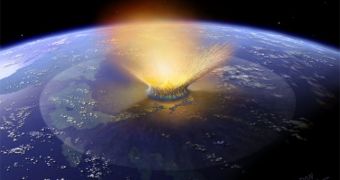International experts gathered earlier this month in Mexico City deemed it necessary to promote the creation of a new international warning and defense system against meteorites. Other types of space rocks are included in the decision as well. Recent reports have revealed that our planet is very ill-equipped to handle its own security, in the event of such a danger. Other than blasting a whole bunch of nuclear weapons to the target, there is not a whole lot we can do at this point, and scientists want to remedy that, Space reports.
The global detection and warming network's main objectives would be to provide considerable forewarning. As soon as a comet, asteroid, meteor, or near-Earth object (NEO) is detected on a collision course with our planet, this system would alert all appropriate authorities. This would ensure that we, as a civilization, would have at least a few years to develop defense mechanisms, so that we could protect ourselves. Knowing about a possible impact just months ahead of time is likely to be useless, as even a full-scale international effort could not build a spacecraft or similar contraption to knock the threat off-course.
“This workshop provided a major step forward in our thinking about the needed components of an information, analysis, and warning network for asteroids,” explains Ray Williamson, the executive director of the Superior, Colorado-based Secure World Foundation (SWF), the organizer behind the meet. Over its three days, the conference brought together asteroid tracking specialists, space scientists, former astronauts and United Nations authorities, along with disaster management, risk psychology and warning communication experts, and all these scientists aimed at developing a common strategy for protecting the planet from a space collision.
“The discussions in Mexico City advanced our understanding of how the global community can better communicate detection and warning information about near-Earth objects (NEOs). The information-sharing effort is an essential first step in dealing with the global hazard posed by asteroids and comets. The ASE looks forward to spreading the results of the recent workshop and urges future work within the UN and by the world's space agencies to develop the capacity to deflect a NEO headed for Earth, a fundamental mission for our space technology,” says Tom Jones.
The expert is also the planetary scientist that currently chairs the Association of Space Explorers (ASE) Committee on near-Earth Objects. The ASE is the organization that currently represents astronauts and cosmonauts worldwide. All participants revealed that the Mexico City workshop was recorded as a considerable progress on the track of setting up the needed international system.

 14 DAY TRIAL //
14 DAY TRIAL //